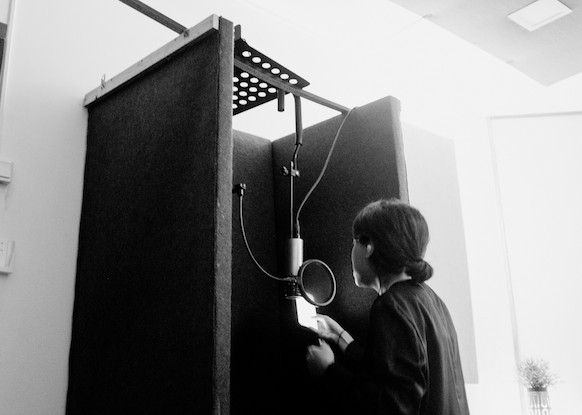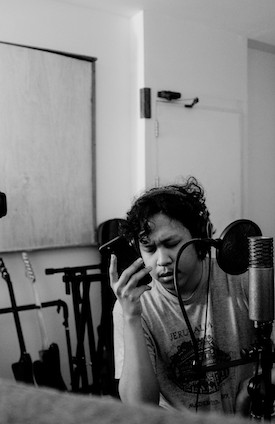Popular Reads
Top Results
Can't find what you're looking for?
View all search resultsPopular Reads
Top Results
Can't find what you're looking for?
View all search results'World's fanciest prison': Lomba Sihir debuts with 'magical' rendition of Jakarta's bittersweet realities
Lomba Sihir is the latest "it" band on Indonesia's indie scene, with a debut album that explores the realities of life in Jakarta through a magical mix of musical genres.
Change text size
Gift Premium Articles
to Anyone
I
t was a pleasant surprise when indie label Sun Eater announced the debut album release of Lomba Sihir at the beginning of the year. The band is something of a supergroup of experienced indie musicians and comprises Natasha Udu and Baskara Putra, both vocalists, with the latter also playing synthesizers and known for heading popular rock band .Feast and solo projects under his stage name “Hindia”, guitarist-vocalist Rayhan Noor, bass player Wisnu Ikhsantama, keyboardist Tristan Juliano and drummer Enrico Octaviano.
The band spoke about their beginnings and how their debut album Selamat Datang di Ujung Dunia (Welcome to the edge of the world) reflects their complicated relationship with Jakarta.
Question: How did Lomba Sihir form?
Answer, Baskara Putra: Lomba Sihir was formed back in mid-2019 as a backing band for my solo projects as Hindia. But there were times when I found having the spotlight all to myself pretty jarring. I wanted everyone to receive the recognition they deserved because ultimately, no matter who wrote the song, we always played it together as a band.
Why did you name the group Lomba Sihir?
Rayhan Noor: The name came from Baskara. Back in college, he formed a band called Lembaga Lomba Sihir, so we took it off of that. The way we see it, music is just like magic that can amaze listeners. But we were worried that the word “sihir” [alone] might be too dark or something [for its association with witchcraft and sorcery], so we reworked it as Lomba Sihir [magic contest or contest of magic].
Tristan Juliano: I feel like when we perform, every single one of us is racing to do [some] magic to make the audience happy. And when our audience is happy, so are we (laughs).
When I listen to Selamat Datang di Ujung Dunia, the album feels completely different from your individual projects. Was this intentional?
Enrico Octaviano: All of us come from different musical genres. Natasha’s sound is more Top 40s pop. Everyone already knows what Baskara’s music sounds like from his solo projects. Tristan is always unpredictable when it comes to making music. Rayhan, Wisnu and I dabble in rock. Despite our differences, though, we decided to collaborate by strictly being ourselves.
Rayhan: This album is a melting pot of our individualities. If you dissect the album track by track, you will discover a plethora of genres from disco, ‘80s pop, ethnic rock and gospel. These are the genres we love as individuals, and since we have so much trust in one another, we just embraced all of them.
You guys dropped your debut album only a month after releasing lead single “Hati dan Paru-Paru” (Heart and lungs) and its follow-up single, “Apa Ada Asmara” (Is there romance). This is quite unusual.
Natasha: Before we released the album, we had already mapped out our [album] rollout. We deliberately put in a two-week interval between the first and second singles because we wanted a long rollout, perhaps years after the album’s release.
Tristan: “Hati dan Paru-Paru” feels like a perfect lead single for this album. The song feels very representative of who we are as a band. Also, it offers a few pearls of wisdom about what life is really like in Jakarta.
Why the thematic focus on Jakarta?
Wisnu Ikhsantama: We chose Jakarta as the album’s [underlining] narrative because this city is one thing we had in common [...]. Also, the pandemic made us miss what Jakarta used to be, way before lockdowns and stuff like that.
Natasha: [As for] “Apa Ada Asmara”, I was the one who first pitched the concept. I was inspired by the shallowness that motivates people to move to Jakarta. [For example,] just to find love. That’s the only reason [some people] need. That’s how shallow people can be (laughs).
It feels like “Ya Mau Gimana” (Well whaddaya want), “Mungkin Takut Perubahan” (Scared of change, maybe) and “Semua Orang Pernah Sakit Hati” (Everyone’s had heartbreak) form a musical trilogy.
Rayhan: That’s an interesting way to interpret those three songs. Sonically, “Ya Mau Gimana” is about the Jakarta nightlife and the frustration [related to it]. “Mungkin Takut Perubahan”, afterward, feels like the morning after, when all that’s left is exhaustion. It’s the point where you ask yourself, “What am I doing here? Why am I still here?” But, as it turns out, it’s not just you.
“Semua Orang Pernah Sakit Hati” is us pointing out that everyone goes through the same bitterness. Ultimately, Every Jakartan feels like giving up at some point.
Baskara: I feel like these songs are about Jakartans’ cry for help, but they tend to conceal it with self-deprecating humor, which is quite heartbreaking.
Is the song “Nirrlaba” (Nonprofit) satirical?
Wisnu: “Nirrlaba” is our way of turning the tables on the blame we always receive as millennials. It’s unfair that we are always portrayed as being responsible for all the wrong things, not just in Jakarta, but the whole country. Rupiah weakens? It’s on us. Radicalization is back? It’s on us. The entire country always makes us millennials look like the bad guy. We can never seem to get it right!
Do you guys see Jakarta as a permanent home or a temporary stop?
Rayhan: It’s both (laughs). I live in Jakarta because I have to, not because I want to. I feel like emotionally, lots of Jakartans want to leave, but sadly, everything they have is centered in Jakarta, whether their careers or relationships. There’s a line in this album that says Jakarta is “the fanciest prison in the world”. Honestly, I couldn’t agree more.
Selamat Datang di Ujung Dunia was released on March. 26, 2021 and is available on all digital platforms.












